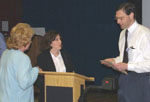Strategic plan unveiled at president's town meeting
by Cindy AbolePublic Relations
Praising faculty and staff recruitment efforts, reviewing the financial health of the institution and unveiling new strategies with the updated strategic plan were among the highlights discussed at last week’s town hall meetings held by MUSC President Ray Greenberg, M.D., Ph.D.
 Dr.
Greenberg answers questions from human resources' Jane Locke and Dana Tumbleston,
April 5.
Dr.
Greenberg answers questions from human resources' Jane Locke and Dana Tumbleston,
April 5.
Greenberg spoke to faculty and staff on separate occasions to review progress in various areas of faculty recruitment, student enrollment, research and private fund-raising, and an eight-month financial assessment of the university, Medical University Hospital Authority (MUHA) and University Medical Associates (UMA).
“Universities, like all organizations, are no better or worse than the people within those organizations,” said Greenberg. “Although there are many things that have happened within the past year, nothing is more noteworthy than the recruitment of some truly outstanding people in leadership positions throughout our campus.”
Among the list of recent recruits are John R. Raymond, M.D., associate provost of research; John L. Waller, M.D., chair of anesthesiology; John M. Oldham, M.D., chair of psychiatry; Thomas E. Keane, M.D., chair of urology; Michael R. Gold, M.D., Ph.D., director of the division of cardiology; Bruce A. Quinlan, CEO of University Medical Associates; and Patrick J. Wamsley, chief financial officer. Short lists of final candidates have been drawn for the positions of chief information officer, chairman of the department of medicine and dean of the College of Nursing.
Greenberg reported that student enrollment has shown a dramatic increase in applications to the nursing and pharmacy fields—reflecting on the caliber of new applicants and the college’s recruitment efforts. He also spoke about the outlook for extramural research funding and private fund-raising, which is currently on track of their respective goals and continued growth.
His financial assessment of the university, MUHA and UMA was generally positive. The university’s budget through February was virtually balanced, despite the 4 percent reduction in state appropriations that had occurred already. With the additional 2.5 percent cut in state funds, keeping the budget balanced this year will remain a challenge.
“What’s been helpful here is that expenditures are down,” Greenberg said. “In a year of 6-1/2 percent statewide budget reductions, I don’t know how we can do any better.”
Both MUHA and UMA report a positive outcome. Greenberg expects that MUHA will finish ahead of the $9 million profit from FY2001. He cautioned that prior years of deficits have exhausted any capital and these reserves must be rebuilt.
Of concern for next year is the potential for a cut in Medicaid funds. As the largest single hospital recipient of these funds, MUSC stands to lose potentially close to $60 million in state funding shortfalls and matched federal dollars.
“We’re not alone in this,” Greenberg said. “Virtually every state has some level of problems with its Medicaid program. The rate of growth with expenditures has been difficult, especially as all states are suffering from the recession right now.”
The second half of the Town Hall meetings focused on longer term planning. Greenberg unveiled the approach and progress of the institution’s strategic planning efforts.
Since the institution’s development of its first strategic plan in 1997, the 2002 Strategic Plan will continue to serve as a compass in planning the future and setting goals for MUSC and MUHA. Leaders and participants have identified four areas of focus or priorities for the 2002 Strategic Plan. They are: resources and environment; impacting health disparities; healthy youth and development and healthy aging. In the April 3 Faculty Town Hall meeting, each work group chairman was introduced and gave a brief presentation about the committee's work.
MUSC Center for Studies on Aging director Lotta Granholm-Bently, Ph.D., DDS, and her group have been meeting twice a week for the past six weeks to formulate various issues related to healthy aging. The group assessed the current infrastructure for clinical services and outreach available to the elderly. They also concluded that collaboration with current programs like the Aging Center and the S.C. Geriatric Education Center would enhance clinical services, outreach and preventive care.
One of the plan’s largest and most popular work groups explores the impact of health disparities and is chaired by Marilyn Laken, Ph.D., professor of nursing and director of the Healthy South Carolina Initiative. Laken and her group have developed a conceptional framework to outline discussions as they continue to explore statewide health disparities and its causes.
Neurology chairman David Griesemer, M.D., briefly spoke of his committee’s progress, which began with acknowledging the need for understanding childhood health concerns and developmental biology. Working with representatives from the Health Science Foundation, Greenwood Genetics Center and other partners, the group will identify the future and unmet needs of South Carolina’s children.
Finally, department of family medicine chairman Bill Hueston, M.D., and the resources and environment work group have explored and identified common financial challenges faced by all departments. They identified the need for more department interaction and improved communications as a prelude to developing action plans and strategies that would support the university and medical center’s future growth.
MUSC Strategic Plan 2002
Four work groups identifying critical campus
issues
Healthy Aging (Dr. Lotta Granholm-Bentley, chair)
To establish a plan that addresses MUSC's role in promoting the health,
increasing longevity, and improving the quality of life of senior South
Carolinians.
Healthy Youth and Development (Dr. David Griesemer, chair)
To determine and outline MUSC's role in improving the health of South
Carolina's youth and to advance knowledge and understanding of human developmental
biology.
Impacting Health Disparities (Dr. Marilyn Laken, chair)
To understand the causes and to develop a plan addressing the conditions
which give rise to health disparities.
Resources and Environment (Dr. William Hueston, chair)
To review aspects of the university's internal and external environment
and to develop a plan which provides a more effective, cooperative and
innovative approach for fulfilling our missions.